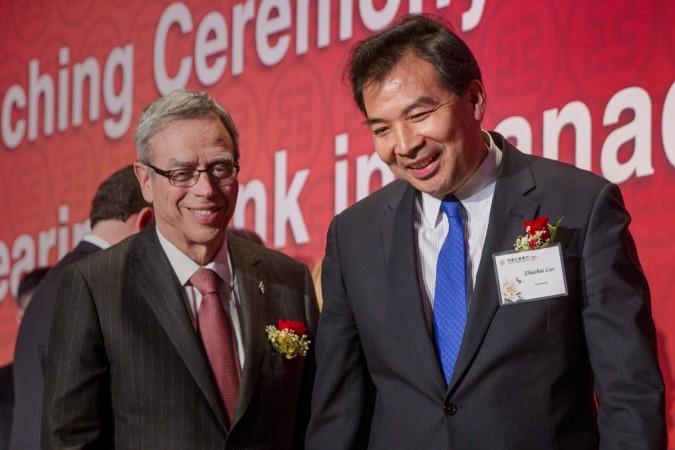
China has proposed a four-point initiative to resolve differences with India and strengthen relations between both countries. The proposal was put forward by Chinese envoy to India Luo Zhaohui while giving a speech at defence think-tank United Service Institution on Friday. However, the text of the speech was made public by the Chinese Embassy only on Sunday.
The four-point initiative includes aligning its 'One Belt One Road' project with India's 'Act East Policy' and also begin fresh negotiations on a free trade pact, the Press Trust of India (PTI) reported. Zhaohui also proposed to begin negotiations between both countries on the 'China-India Treaty of Good Neighbourliness and Friendly Cooperation' and also focus on finding an early solution to the Indo-China border dispute.
"Firstly, start negotiation on a China-India Treaty of Good Neighbourliness and Friendly Cooperation. Secondly, restart negotiation of China-India Free Trade Agreement. Thirdly, strive for an early harvest on the border issue. Fourthly, actively explore the feasibility of aligning China's 'One Belt One Road Initiative' (OBOR) and India's 'Act East Policy'," the Chinese envoy said.
Zhaohui added that if both countries agreed, China was willing to mediate talks between India and Pakistan so that they can resolve their disputes. He further added that good relations between India and Pakistan were required to maintain stability in the region and also to cater to China's interests.
"Otherwise, how could we open up and develop? That's why we say, we are willing to mediate when India and Pakistan have problems. But the precondition is that both India and Pakistan accept it. We do this only out of goodwill. We do hope that there is no problem at all... When the Mumbai terrorist attack on November 26, 2008, took place, I was Chinese Ambassador to Pakistan, and I did a lot of mediation at that time," Zhaohui said.
However, when asked about the China Pakistan Economic Corridor (CPEC) that passes through Pakistan-occupied Kashmir, the Chinese envoy said that the government of his country does not intend to interfere in the sovereignty and territorial disputes between India and Pakistan.
"China supports the solution of the disputes through bilateral negotiations between the two countries. The CPEC is for promoting economic cooperation and connectivity. It has no connections to or impact on sovereignty issues," he said.
"Even we can think about renaming the CPEC. China and India have had successful experience of delinking sovereignty disputes with bilateral relations before. In history, we have had close cooperation along the ancient Silk Road. Why shouldn't we support this kind of cooperation today? In a word, China is sincere in its intention to cooperate with India on the OBOR, as it is good for both of us," Zhaohui added, according to PTI.
Zhaohui also responded to the general view in India that China always prioritises Pakistan when it comes to dealing with its relations with countries in South Asia. He said that the Chinese government always follows that 'China first' and that "we deal with problems based on their own merits. Take Kashmir issue for example, we supported the relevant UN resolutions before 1990s. Then we supported a settlement through bilateral negotiation in line with the Simla Agreement. This is an example of China taking care of India's concern."
The Chinese envoy's proposal comes amid tension between the two countries over Dalai Lama's recent visit to Arunachal Pradesh, China's opposition to India's bid to enter the Nuclear Suppliers Group (NSG) and to list Jaish-e-Mohammed (JeM) chief Masood Azhar as a global terrorist at the United Nations.
When asked about China's opposition to India's bid to enter the NSG, Zhaohui said: "We do not oppose any country's membership, believing that a standard for admission should be agreed upon first."
He also said that China "strongly opposes" terrorism and that it "is ready to work with India, Pakistan, Afghanistan and the international community in fighting terrorism, and believes that terrorism knows no borders; third, countries need to have compatible policies, consensus and actions in fighting terrorism."
The Chinese envoy added that people tend to "misread" China and think that it does not want "to see India developing." He said that this "conception is wrong" and that the Chinese government "hope to see India develop well and we are more than happy to help India develop to achieve common development."








